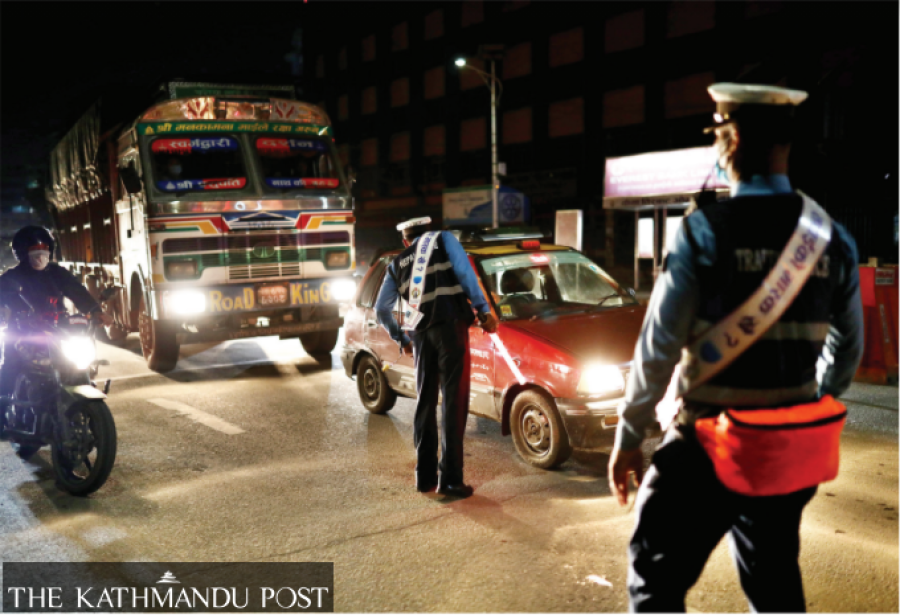Valley
Drink-driving cases, road accidents decline after night-time ban on vehicles
Traffic police officials attribute the drop to reduced public mobility and fewer checks.
Anup Ojha
The ban on all types of vehicles in the Valley except those in emergency services after 8pm since August 10 may have drawn widespread criticism, but this has come as a respite for at least one group–traffic police personnel who had to man the roads till late to check drink-driving.
“Since non-essential vehicles are banned, this has automatically reduced road traffic in the Valley,” said Superintendent Sanjib Sharma Das, who is also the spokesperson of the Metropolitan Traffic Police Division, Kathmandu.
Although public health experts have criticised the night-time ban calling it a futile exercise as the virus does not distinguish between day and night, traffic police say road accident cases have come down since the imposition of the ban. According to them, there are hardly any cases of drink-driving now.
“Before the ban, we would register at least 20 cases of drink-driving daily, but there are no such cases now,” said Das. “The ban has also brought respite to the traffic police as it has greatly reduced road accidents.”
Ever since the country was hit by the first wave of Covid-19 pandemic in March last year, police crackdown on drink-driving has become ineffective since they have stopped using breathalysers fearing virus transmission.
Even when the traffic police in October last year announced stringent measures against drink-driving during the Dashain festival in Kathmandu Valley, public health experts had criticised the move saying it would put both police and motorists at high risk of virus infection.
The traffic division’s data show that in the past two years, they issued tickets to a total of 9,702 motorists for drink-driving. However, before the pandemic, in the fiscal year 2018-19, the number of motorists booked for drink-driving was 31,987.
Those booked for drink-driving are fined Rs 1,000 and made to attend a one-hour class on traffic rules. But since the first week of January, the traffic police division has been collecting the fines through an online payment system and taking the classes virtually due to the pandemic. Every day, around 180 rule-breakers have been attending the one-hour class, according to traffic police officials.
“The fewer numbers are because public mobility has come down and we have reduced random checks for drink-driving,” said Senior Superintendent Janak Bhattrai, also the chief of the division.
The division spokesperson, Das, said of late police have not been using breathalysers and instead they nab motorists who are found driving carelessly at night or behaving unusually or aggressively after drinking.
“But since last week, we have stopped looking for drunk drivers as our job has been to detain any public or private vehicle found violating the night-time ban,” said Das.
In the past one week alone, traffic police have detained a total of 2,425 vehicles for operating after 8pm. Das said such vehicles are detained for two hours and released. “But if motorists have genuine reasons for driving at night, then we take no action,” said Das.
He said 700 traffic police are deployed across the Valley to enforce the nighttime ban on vehicles.
Although the ban has been criticised for being short-sighted and impractical as major market hubs in the Valley remain crowded throughout the day with people ignoring social distancing and other health protocols, traffic police officials credit the ban for the drop in drink-driving and nighttime road accidents.
Meanwhile, Nepal on Friday reported 3,042 new coronavirus cases with 26 Covid-19 related fatalities taking the nationwide infection tally to 744,307. Kathmandu Valley recorded 898 new infections in the past 24 hours. Of these, 604 cases were confirmed in Kathmandu, 187 in Lalitpur and 107 in Bhaktapur.




 9.7°C Kathmandu
9.7°C Kathmandu.jpg)














